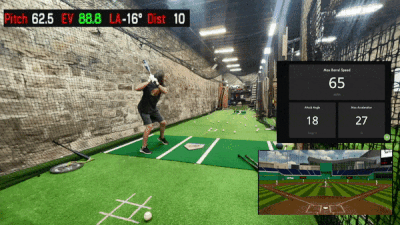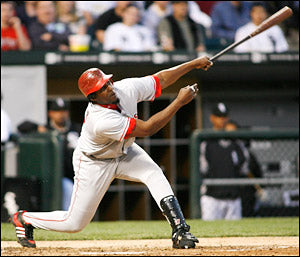When it comes to youth sports, practice time can be all over the place (to say it nicely)
Work on this, or don't work on that, it can be very confusing to get the most out of the time spent practicing with players.
As a coach of a youth team how can you get the most out of your practice time?
In this blog, we will discuss some first principle practice design ideas that you can implement into your practices today!
Begin With The End In Mind
The talent gaps that exist in most games at the amateur levels of sports is massive. Especially at the youth levels. I'm not saying that basic strategies won't sometimes win or lose a game but closing the talent gap in the key areas of the game has to be your primary purpose in practice.
When designing a practice plan you need to consider the game and ask yourself as a coach:
What actions are happening most often (pitching, catching, defense, throwing, hitting)?
AND
Are we good/talented in those actions?
Then spend all of your practice time on these actions.
This isn't fancy coach language or going to blow away other coaches with how smart you sound, but this will win you ball games.
As a high school head coach in 2011, I took a group of under-talented players (we were picked to finish 3rd in our tiny little district in the southwestern corner of Virginia) to the State Championship game on these 3 (not so fancy) ideas
1. We will field (includes throws) the ball better than our opponents
2. We will hit better than our opponents
3. We will pitch better than our opponents
We spent little to no practice time on anything outside of these 3 things. By the end of our season the number of reps we had in these areas we so far superior to our opponents that we won 15 straight games until we finally went down in the State Championship game.
As a coach, closing the talent/skill gap between your team and the best teams is your primary job if you want to win. Anything else is a waste of practice time and effort
Way too much time is spent on one-off and fringe events that might occur 3 times a year and the MAIN THINGS are not proportionately given practice economy given how often they happen!
This can go all the way up to high school where the talent gaps are still very wide. If you are on the wrong end of the talent gap YOU HAVE TO spend all of your time trying to close it. Not working on the one off bunt coverage or 1st and 3rd D that won't matter because you're down 8-0 because you can't hit, pitch or field better than your opponent.
Organize Your Time and Space Accordingly
When my son was 7 his coach asked me to help him with a practice plan. Good on him. Not that I know everything there is to know but I do spend all of my days thinking about better ways to develop players and consult with some of the best college baseball/softball coaches in the country on practice design. I've gained a lot of perspectives that, I think, are worth considering.
Here's what I sent him
For those of you ridiculing my 7U Velo throwing without the capacity to think openly here is the greater warm up plan for the first 20 minutes of practice.
— Chad Longworth (@clongbaseball) March 10, 2021
Trying to touch on all individual defensive skills with maximum efficiency and reps #firstprinciples pic.twitter.com/FQsHZezWQE
The defensive design principles were this:
-Throw a ball hard
-Throw a ball accurately
-Catch a ground ball & make a throw to a base
-Catch a throw from a fielder at a base
-Catch a fly ball
That was pretty much it for defense. If they could do these basic things, we could start to play games well. No talking. Just reps, and lots of them as quickly and efficiently as possible.
If you want to "teach" what bases to throw to or when to throw to them PLAY THE ACTUAL GAME in practice. Players are making decisions in real time based upon the information in front of them. If your practices lack the information present in the game, the possibility of carry over is low.
This simply means, talking about what to do with the ball, and actually getting a ball hit to you with runners running and players moving accordingly are NOT THE SAME thing.
Players are processing information in real time and their skill is emerging in a relationship to what is happening in front of them. They are not acting on pre-downloaded information and recalling that information in a fight or flight moment!
Hitting is Hard, Represent The Demands of The Game
Hitting is hard. It takes time and patience for most hitters to develop. When they come to your practice you're main job is to get them reps that resemble the demands of the game as much as possible. Even if it is in a scaled down way (slower pitch, bigger ball, etc)
The offensive practice design principles are this:
- Swing the bat fast
- Swing the bat at moving objects (bat to ball skills)
- Hit with count & defense present so they understand the consequences to the team of your at bat.
Again, little to no "instruction" or "corrections".
Just reps. Lots of reps.
You would be shocked at how little we talk about the mechanics of individual players whenever I go to the top college programs in the country to talk about their practice design. It is almost never. Yet, when I go to youth practices this is almost all they want to talk about! It's wild to see
Find a Way To Measure What Matters
If you are running a youth rec or club team progress in the big skill areas should be the goal. Often times the outcome of winning becomes how players/parents extract value from the experience but this can be a distraction from progress and ultimately limiting the time you get to play the game in the long term.
Winning and development also don't have to be an either or proposition. You can pursue winning and compete to win WHILE developing the tools, skillsets, and action capacities of each individual player in a test/retest model.
“If you’re a youth coach you have to make a decision. Do you wanna help the players to develop themselves or do you just want to win the youth league?” ~ Stan van Gundy pic.twitter.com/mJzBAaleuj
— Jorg van der Breggen (@JvanderB78) March 26, 2023
The problem is that without measurable feedback on the big skills it's difficult to see or track progress in 3,6, or 12 month intervals.
This is easy to do with technology today. A radar gun to track arm strength, and a bat sensor to track bat speed can do a lot for your team, even if you aren't winning games (I hope you are, but not at the expense of player improvement).
You can write these numbers down in a simple bullet journal, weight lifters have been doing this for years.
Conclusion
This is a simple version of a topic I could talk a lot about. Ultimately I want all players to enjoy playing the game, socialize and make friends in the game, and grow their big skills so that they get the opportunity to keep opening doors in the game as long as possible.
Playing baseball is a great experience and I want all kids to play as long as possible. Don't leave "being good enough" on the table as a reason their journey ended sooner than it should have,








